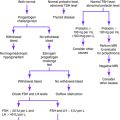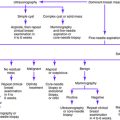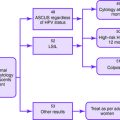Chapter 34 RECURRENT MISCARRIAGE
Miscarriage, or spontaneous abortion, is the spontaneous loss of a fetus at less than 20 weeks’ gestation in the absence of elective medical or surgical measures to terminate the pregnancy. Recurrent miscarriage is defined as three or more consecutive pregnancy losses, although many clinicians define recurrent miscarriage as two or more losses. According to the latter definition, recurrent miscarriage affects from 1% to 5% of all couples trying to conceive. Fetal demise after the sixth month of gestation is rare, occurring in fewer than 4 per 1000 pregnancies.
Causes of Recurrent Miscarriage
Key Historical Features
Suggested Work-Up
| Pelvic ultrasonography | To evaluate for uterine abnormalities and ovarian structure |
| Parental peripheral blood karyotype | To evaluate for an abnormal karyotype |
| Measurement of early follicular-phase follicle-stimulating hormone (FSH) | To assess ovarian reserve |
| Measurement of lupus anticoagulant antibody and anticardiolipin antibody | To evaluate for antiphospholipid syndrome |
| Test for Factor V Leiden | To evaluate for Factor V Leiden gene mutation |
| Test for prothrombin gene mutation | To evaluate for prothrombin G20210A gene mutation |
Additional Work-Up
| Measurement of protein S | If thrombophilia is suspected, to evaluate for protein S deficiency |
| Measurement of protein C | If thrombophilia is suspected, to evaluate for protein C deficiency |
| Measurement of antithrombin III | If thrombophilia is suspected, to evaluate for antithrombin deficiency |
| Measurement of homocysteine | If thrombophilia is suspected, to evaluate for hyperhomocysteinemia |
| Test for MTHFR C677T | If thrombophilia is suspected, to evaluate for point mutation in the methylene tetrahydrofolate reductase gene |
Griebel CP, Halvorsen J, Golemon TB. Management of spontaneous abortion. Am Fam Physician. 2005;72:1243-1250.
Hogge WA, Byrnes AL, Lanasa MC, et al. The clinical use of karyotyping spontaneous abortions. Am J Obstet Gynecol. 2003;189:397-400.
Kujovich JL. Thrombophilia and pregnancy complications. Am J Obstet Gynecol. 2004;191:412-424.
Miller TE, Estrella E, Myerburg RJ, et al. Recurrent third-trimester fetal loss and maternal mosaicism for long-QT syndrome. Circulation. 2004;109:3029-3034.
Rai R, Regan L. Recurrent miscarriage. Lancet. 2006;368:601-611.
Rasch V. Cigarette, alcohol and caffeine consumption: risk factors for spontaneous abortion. Acta Obstet Gynecol Scand. 2003;82:182-188.
Walker ID. Thrombophilia in pregnancy. J Clin Pathol. 2000;53:573-580.





